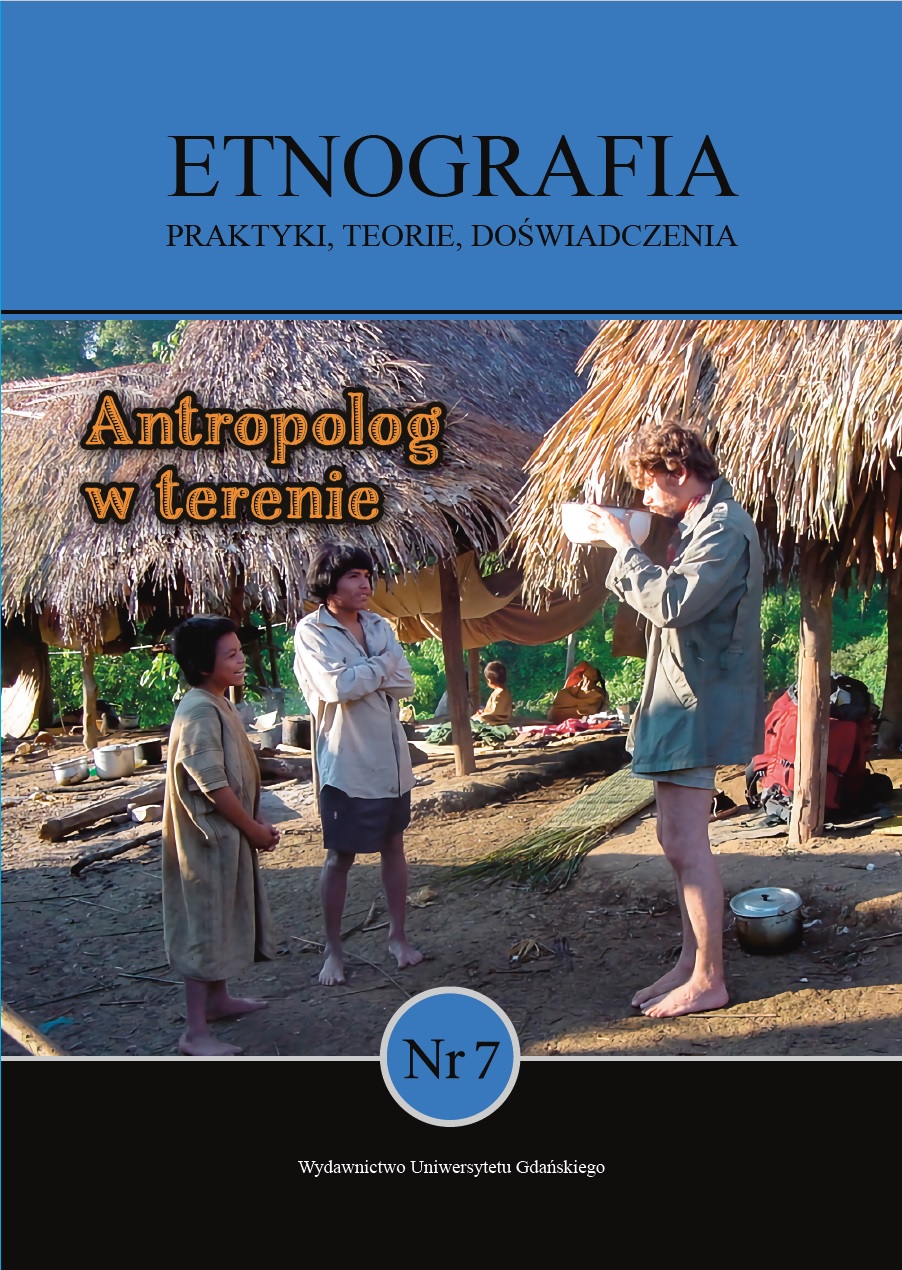Teren, wspólnota, etyka: w poszukiwaniu „właściwej” drogi w terenowych badaniach antropologicznych
DOI:
https://doi.org/10.26881/etno.2021.7.15Słowa kluczowe:
ethics, fieldwork, space, action research, interlocutorsAbstrakt
In this article, I elaborate on some ethical and methodological doubts that have emerged in the course of my ethnographic fieldwork. They relate to the process of constructing the field, moments of collective experimentation, and the process of developing long-term relationships between the ethnographer and his or her interlocutors. I show how the stage of constructing the field may be uncertain and contingent, yet at the same time crucial for understanding the studied phenomena. I then explain how some forms of closeness and friendship in the field may be also transform into common social and artistic projects. Finally, I reflect on deeper ethical tensions related to authorship and authorization during the writing-up stage of research. I argue that some forms of collaboration in the field lead both towards a form of shared authorship and to the necessity to make our interlocutors’ identity anonymous and invisible.
Downloads
Bibliografia
Amit, V. (2000). Constructing the Field. Ethnographic Fieldwork in the Contemporary World. London-New York: Routledge.
Aretxaga, B. (2003). Maddening States. Annual Review of Anthropology, 32, 393–410. Clifford, J. (2000). Kłopoty z kulturą. Dwudziestowieczna etnografia, literatura i sztuka. Warszawa: Wydawnictwo KR.
Code of Ethics (1998). Code of Ethics, American Anthropological Association, http://s3.amazonaws.com/rdcmsaaa/files/production/public/FileDownloads/pdfs/issues/policy-advocacy/upload/ethicscode.pdf [dostęp 25.07.2020].
Estalella, A., Criado, T. (2018). Experimental Collaborations. Introduction. W: A. Estalella, T. Criado (red.), Experimental Collaborations. Ethnography Through Fieldwork Devices (s. 1–30). Oxford: Berghahn Books.
Gupta, A., Ferguson, J. (2006). Poza „kulturę”: przestrzeń, tożsamość i polityka różnicy. Przeł. J. Giebułtowski. W: M. Kempny, E. Nowicka (red.), Badanie kultury. Elementy teorii antropologicznej. Kontynuacje, t. II (s. 267–283). Warszawa: Wydawnictwo Naukowe PWN.
Godlewski, G. (2008). Słowo-pismo-sztuka słowa. Perspektywy antropologiczne. Warszawa: Wydawnictwa UW.
Holmes, D., Marcus, G. (2008). Collaboration Today and the Re-imagination of the Classic Fieldwork Encounter. Collaborative Anthropology, 1, 81–101.
Kasatkina, A., Vasilyeva, Z., Khandozhko, R. (2018). Thrown into Collaboration. An Eth- nography of Transcript Authorization. W: A. Estalella, T. Criado (red.), Experimental Collaborations. Ethnography Through Fieldwork Devices (s. 132–153). Oxford: Berghahn Books.
Mosse, D. (2006). Antisocial anthropology? Objectivity, objection, and the ethnography of public policy and professional communities. Journal of the Royal Anthropological Institute, 12, z. 4, 935–956.
Olędzki, J. (1991). Murzynowo. znaki istnienia i tożsamości kulturalnej mieszkańców wioski nad- wiślańskiej XVIII-XX w. Warszawa: Wydawnictwa UW.
Pfaffenberger, B. (1992). Technology and Social Change. Annual Review of Anthropology, 21, 491–516.
Rakowski, T. (2009). Łowcy, zbieracze, praktycy niemocy. Etnografia człowieka zdegradowanego. Gdańsk: słowo obraz/terytoria.
Rakowski, T. (red.) (2013). Etnografia/animacja/sztuka. Nierozpoznane wymiary rozwoju kulturalnego. Warszawa: Narodowe Centrum Kultury.
Skąpski, Ł. (2013). O urządzeniach z Broniowa i Ostałówka. W: T. Rakowski (red.), Etnografia/animacja/sztuka. Nierozpoznane wymiary rozwoju kulturalnego (s. 220–235). Warszawa: Narodowe Centrum Kultury.
Ssorin-Chaikov, N. (2013). Ethnographic Conceptualism. An Introduction. Laboratorium, 5 (2), 5–18.
Tokarska-Bakir, J. (1995). Dalsze losy syna marnotrawnego. Projekt etnografii nieprzezro- czystej. Konteksty. Polska Sztuka Ludowa, 1, 13–22.
Turkle, S. (2008). Inner History. W: S. Turkle (red.), The Inner History of Devices (s. 2–31). Cambridge: MIT Press
Turner, V. (2005). Dramaty społeczne i opowieści o nich. Przekł. M. i J. Dziekanowie. W: Od rytuału do teatru. Powaga zabawy. Warszawa: Oficyna Wydawnicza Volumen.
Pobrania
Opublikowane
Wersje
- 2023-10-17 - (2)
- 2021-12-23 - (1)
Jak cytować
Numer
Dział
Licencja
Czasopismo wydawane jest na licencji Creative Commons Uznanie autorstwa-Na tych samych warunkach 4.0 Międzynarodowe.

 Uniwersyteckie Czasopisma Naukowe
Uniwersyteckie Czasopisma Naukowe








